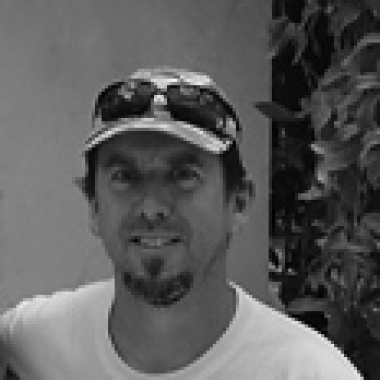Prospecting & Detecting
Trip to “The Swamp” on Behalf of Small Miners
April 2018 by Scott Harn
(Referenced in this article: Small Miner Amendments to S 145)
On Monday evening, March 13, I arrived in Washington, DC—aka “the swamp”—and met up with Clark Pearson of Public Lands for the People to see if we can get some relief for small-scale miners. Our first stop: the Environmental Protection Agency (EPA).
Tuesday. The first meeting went very well. PLP member Don Smith had put together a summary of the issues facing suction gold dredgers in Idaho. This included meetings with the Idaho DEQ and their reluctance to follow the law regarding suction dredge mining.
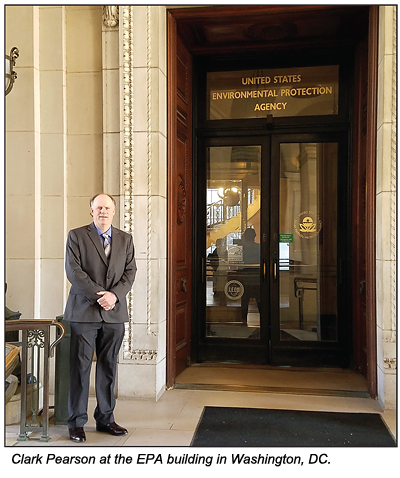 Don’s letter to EPA Administrator Scott Pruitt requested clarification and guidance be issued by the EPA regarding suction gold dredging and permitting. Numerous courts have affirmed that no NPDES permit is required when there is no addition of a pollutant. Of course, there is no addition caused by use of a suction gold dredge; material is pulled through the dredge and placed at or near its original location. State agencies—like the Idaho DEQ and others across the West—are fearful of losing their funding if they determine that a NPDES permit is unwarranted.
Don’s letter to EPA Administrator Scott Pruitt requested clarification and guidance be issued by the EPA regarding suction gold dredging and permitting. Numerous courts have affirmed that no NPDES permit is required when there is no addition of a pollutant. Of course, there is no addition caused by use of a suction gold dredge; material is pulled through the dredge and placed at or near its original location. State agencies—like the Idaho DEQ and others across the West—are fearful of losing their funding if they determine that a NPDES permit is unwarranted.
We appreciate the support of members of the Idaho legislature who signed on to the letter:
- Idaho State Senator Carl Crabtree
- Idaho State Rep. Barbara Chase
- Idaho State Rep. Priscilla Giddings
- Idaho State Rep. Don Cheatham
- Idaho State Rep. Paul Shepherd
- Idaho State Rep. Terry Gestrin
- Idaho State Rep. Ron Mendive
We hand-delivered this letter to the EPA and had the opportunity to discuss the legal background. Clark had already completed the legal research and provided supporting documentation, including the legal definitions of “incidental fallback” and “addition of a pollutant,” along with the related court cases.
EPA staff understood the issue and stated they will get it to the appropriate department head.
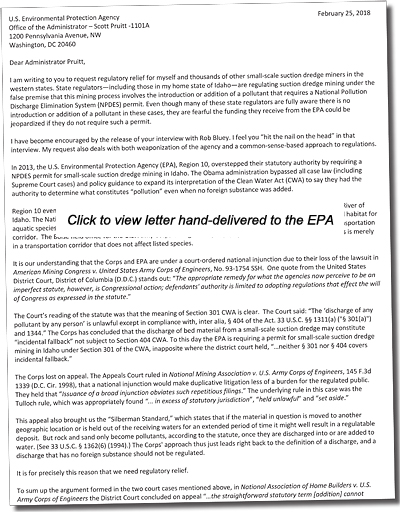 Besides the EPA issue, our major priority is to work on the proposed amendment to the National Strategic and Critical Minerals Production Act (S 145), a bill proposed in the Senate by US Senator Dean Heller (R-Nevada).
Besides the EPA issue, our major priority is to work on the proposed amendment to the National Strategic and Critical Minerals Production Act (S 145), a bill proposed in the Senate by US Senator Dean Heller (R-Nevada).
Clark authored our proposed amendment to address issues faced by small-scale miners that were not included in Heller’s bill. (See “PLP to Address Needs of Small Miners with Proposed Amendment” in our March 2018 issue.)
During lunch we learned that Senator Mike Crapo (R-Idaho) and Senator James Risch (R-Idaho) are co-sponsors of S 145, so we headed over to their offices. We presented the proposed amendment, provided copies to the staffs at both offices, and made arrangements to speak with their legislative directors at a later date.
Our last afternoon meeting was with Andrew Williams, the legislative director for Senator Dean Heller. Andrew seems to understand many of the issues small-scale miners face. Clark went through the legal authorities for each change we are seeking in the proposed amendment and provided Andrew with the documentation to back them up. Andrew recommended we also touch bases with the staff of Senator Steve Daines (R-Montana) and with Senator Lisa Murkowski (R-Alaska).
We headed over to Senator Daines’ office and met with his staff and provided them with a copy of the proposed amendment and the justification behind it.
Wednesday. We had a good meeting with the legislative assistant for Congressman Don Young (R-Alaska). She understood the reasons behind the amendment and was supportive of our proposed amendment.
We spent quite awhile trying to get in to see Senator Lisa Murkowski (R-Alaska), but had to settle for providing the proposed amendment and supporting materials to her staff. She is the Chair of the Senate Energy and Natural Resources Committee. She currently has an 898-page bill (S 1460), the Energy and Natural Resources Act of 2017, that actually has little to do with mineral development. We spent a couple of hours reviewing that bill last night. We will follow up with her staff at a later date.
It was a very busy afternoon! We provided our proposed amendment and background information to the staffs of Congressman Raul Labrador (R-Idaho), Senator Cory Gardner (R-Colorado), Congressman Louie Gohmert (R-Texas), Congressman Mike Coffman (R-Colorado), Congressman Doug Lamborn (R-Colorado), Congressman Scott Tipton (R-Colorado), Congressman Doug LaMalfa (R-California), and Congresswoman Liz Cheney (R-Wyoming).
We focused on these legislators because they are on either the US Senate Energy and Natural Resources Committee or the US House Committee on Natural Resources, and we’ll need their support to get the amendment passed out of committee. Our job will be to follow up with each of them upon our return to answer any questions they might have and to gauge their support.
We also tried to make an appointment prior to our DC trip with Cathy McMorris-Rodgers (R-Washington) at the suggestion of several miners in Washington State, but the response we received was that she had no time for us during our six days in DC.
One of the difficulties we face is the turnover in DC. We were first here in March 2017, and during that one-year period around 60% of the legislative directors in the various offices have moved on to other jobs—some are working for other members of Congress, some have moved on to the private sector, and others are working for one of the agencies at the Department of Interior. When we walked into an office and requested a specific person, there was a decent chance they were no longer there.
Ideally, we would like to return to DC in a month to sit down with each of them to continue this effort if Public Lands for the People receives sufficient funding from the small mining community.
Thursday. We spent the morning discussing Forest Service access and over-regulation issues for small miners. A staff member stated he was not as knowledgeable and proficient in Forest Service mining complaints and mining regulations as he would like to be and asked Clark and I if we would be willing to work with him on mining-related issues going into the future. He stated things are still very fluid at the Department of Agriculture; there are still may openings to be filled and many others who need to be let go. There is a large void caused by a lack of confirmations that can be attributed to Senator Chuck Schumer (D-New York, and Minority Leader in the Senate) delaying confirmations. He stated it’s a priority for his agency to return to supporting miners, ranchers, loggers and other public land users. We will be following up with him upon our return home.
Next we met with Congressman Paul Gosar (R-Arizona) personally, and presented our proposed amendment to him and his legislative director. Rep. Gosar is working on a host of issues that impact small miners. He recognized there are problems at the highest levels in DC, including some high-level attorneys in the Department of Justice who are still arguing in support of Obama-era policies even though those policies have changed.
Rep. Gosar is a co-sponor of HR 520, which is the companion bill to S 145 by Dean Heller. Rep. Gosar pledged to have his legislative director review our proposed amendment and get back to us.
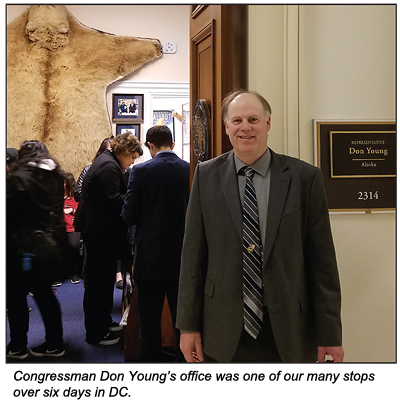 Rep. Gosar also mentioned the confirmation problem. He stated at the current rate, it will take ten years to get all of the vacant appointments filled!
Rep. Gosar also mentioned the confirmation problem. He stated at the current rate, it will take ten years to get all of the vacant appointments filled!
This was another long day. After a late lunch we met with Representative Tom McClintock (R-California), chairman of the Public Lands subcommittee. We talked about our proposed amendment and discussed issues related to NEPA, over-regulation, the lack of timber harvesting, and more. We will follow up with him when we return.
We tried to meet with Congressman Mark Amodei (R-Nevada), but he was not available. We provided copies of our proposed amendment and supporting documentation to his staff and will follow up at a later date.
The next meeting was with the staff of Congressman Rob Bishop (R-Utah), chairman of the House Natural Resources Committee.
They had some rather disheartening news about the Land and Water Conservation Fund. There are bills moving through the House that propose to fully fund the LWCF, which has been a thorn in the side of public land users of all types. Despite not being able to adequately care for public lands currently under their care or control, and the $11.7 billion backlog in deferred maintenance at national parks, many in the federal government want to continue to add to the federal estate. (Senator Lisa Murkowski (R-Alaska) also has $50 million in LWCF money in her 898-page proposed bill.)
These LWCF funding bills have broad support on both sides of the aisle, and many members of Congress in the eastern states simply do not comprehend the amount of lands tied up by the federal government in the West and what the loss of tax revenues can do to rural economies.
We discussed our proposed amendment and supplied the documents to Chairman Rob Bishop’s staff.
In the evening we had a discussion with a staff member about NEPA and changes that could be made to streamline the regulatory process. Again, we discussed our proposed amendment and offered our assistance in helping to streamline the regulatory process for small-scale miners.
During the Thursday and Friday meetings, Joe Martori and Bill Jensen were there representing the Minerals and Mining Advisory Council (MMAC). They offered up a list of minerals and metals that need to be added to the list of critical and strategic minerals and metals, and discussed ways that mining districts could provide assistance.
(MMAC has reorganized, with Bill Jensen as the new president, and Jensen reports they have converted to a 501(c)(6) organization which allows them to spend more funds on lobbying activities.)
Over dinner, Clark and I were discussing the possibility of permitting suction gold dredging through the US Forest Service, bypassing the requirement for a state suction dredge permit for miners in states where the state has been obstructing this method of mining. This might be beneficial in some states, though suction dredge miners in states like Idaho would likely prefer staying under state regulations if we can get the requested clarification/guidance issued by the EPA. Allowing the suction dredge miner to choose if he/she wants to be regulated by the USFS or the state may be a viable option. It seems like an opportune time to approach this issue because of the administration change in DC. We will be having further discussions about dredging, access issues, and more throughout the next month.
Friday. We started out with a lively discussion with staff members about NEPA, suction gold dredging, (the lack of) timber production, Endangered Species Act, putting an end to the Land and Water Conservation Fund (LWCF), DRCP (Desert Renewable Conservation Plan), habitat conservation plans run amok, and much more.
One of the more contentious discussions was about the lawyers for the Department of Justice, USDA and all the agencies under the Department of Interior. The lawyers in DC and across the West are operating as if Obama is still in office, walking all over the rights of miners, ranchers and energy producers. Clark and others present at this meeting made it very clear the Trump Administration needs to clean house and put lawyers in place who will support the Trump Administration’s position.
There was an obvious and welcome change in the attitude of the staff members we spoke with compared to the past administration.
Although Clark and I had both been cleared for the next meeting in advance, we were part of a larger group that was there to discuss similar issues and there was not enough room for both Clark and myself to attend. So, sadly, I walked around like a tourist for a couple of hours—Clark is much more proficient in the law and issues facing small miners than I am, and he needed to be included.
Clark reported that more quality ideas were exchanged, which included a discussion about additional national monuments that need to be reduced or rescinded. Clark presented a copy of the letter I mentioned previously regarding the EPA and suction dredging, the one written by Don Smith of Idaho and signed by seven members of the Idaho legislature. Staff stated the President was unaware of the problems faced by suction dredgers and agreed to make sure the President knows that follow-up is needed with the EPA about the clarification and guidance requested.
In the afternoon, we had three hours of meetings in the House of Representatives with staff members from numerous House and Senate committees. We had serious discussions about many of the same topics—LWCF, national monuments, NEPA streamlining, management plans, ESA, EPA, DRCP, and lawyers for the various agencies who are still arguing cases as if they represent the Obama administration priorities.
Saturday. This was a meeting that lasted the entire day, but I’m not at liberty to discuss this one. I’ll just say it was a strategy meeting.
Final Thoughts. We have an opportunity for some big changes that will provide much needed relief for small-scale miners. We have a few bills and a few issues on which we need your help.
The proposed amendment addresses problems with NEPA, timely review of plans and notices and approval by operation of law if the agency fails to meet the deadline, MSHA exemptions for small operators, land designations that are detrimental to mining including re-opening closed or designated lands with the approval of a competent geologist, and establishes minimum qualifications for personnel who review notices or plans.
It also re-establishes previous thresholds for “casual use” and more, all in a clear, concise, five-page document.
As I mentioned before, we focused on members of Congress in key committees to get our proposed amendment started through the process. Here’s what we need from you:
If you see the name of your Representative or Senator in this article, please contact them and ask them to support the “Small Miner Amendments” to S 145 by Senator Heller, and HR 520 by Congressman Mark Amodei. I would suggest you print out a copy of "Small Miner Amendments" and provide it to your members of Congress along with your message of support.
If you send a letter or note to your members of Congress, please provide a copy to me as well. (I don't need additional copies of the Small Miner Amendments, just your message of support.) Our goal is to provide a large stack of your letters/comments to each member of Congress on our next trip to show them there is plenty of support from their constituents. You can send a copy to us by mail at:
ICMJ, attn: Amendment Comments, PO Box 2260, Aptos, CA 95001
Or you can email them to me (please put "Amendment Comments" in the subject field.)
It is very critical that you remain polite and keep your comments short and sweet so they are not tossed aside.
Example:
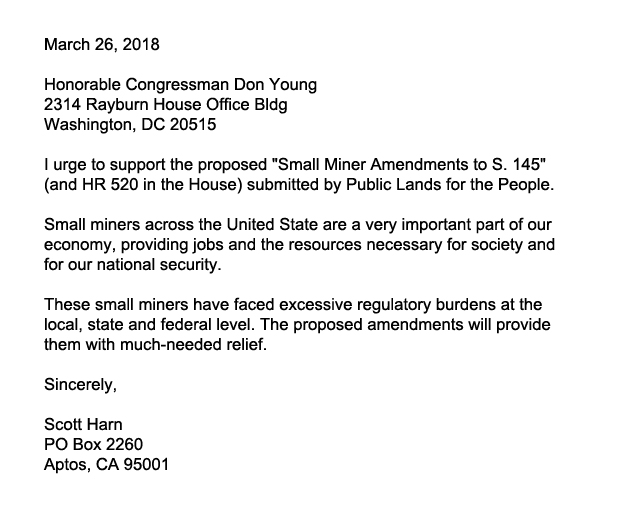
And there is another item we need help with: We are asking all of you to please fire off a letter, phone call or email to Senator Cory Gardner (R-Colorado). Senator Gardner is holding up the confirmations of several key appointees for the Department of Justice in a protest because he wants Attorney General Jeff Sessions to change his position on marijuana enforcement. These appointees are desperately needed to “right the ship” in the Department of Justice and to rein in the lawyers who are still prosecuting individuals based on Obama-era policies. This blockade is negatively impacting public land users all across the West.
If Senator Gardner wants to continue his protest, he needs to find another avenue that does not hold up these desperately needed appointees and harm public land users!
Please be respectful when you send him a message.
Contact info for Senator Cory Gardner:
Senator Cory Gardner
354 Russell Senate Office Building
Washington, D.C. 20510
Phone: (202) 224-5941
Fax: (202) 224-6524
You can send him an email using this form: www.gardner.senate.gov/contact-cory/email-cory
And this is his Facebook page: www.facebook.com/SenCoryGardner/
This is how you reach him on Twitter: @SenCoryGardner
 I want to close by saying that we have an opportunity here and now that we must take advantage of. PLP and our publication are committed to doing whatever is necessary to get relief for small-scale miners. And I want to thank Public Lands for the People for their unwavering support.
I want to close by saying that we have an opportunity here and now that we must take advantage of. PLP and our publication are committed to doing whatever is necessary to get relief for small-scale miners. And I want to thank Public Lands for the People for their unwavering support.
If you haven’t joined PLP, please do. You can obtain a discounted membership to PLP when you subscribe or renew on our website, or just make a contribution to PLP. You can also support them through their 2018 raffle. Thank you in advance. (PLP website: www.publiclandsforthepeople.org)
---------------
Corrections: Congressman Mark Amodei was incorrectly listed as "R-California." He represents Nevada. Congressman Raul Labrador was incorrectly listed as "R-Colorado." He represents Idaho.
Using Sucker Guns to Find Gold
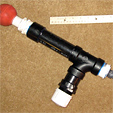 ...if you have a good, rich spot, hand-operated systems can produce some decent gold.
...if you have a good, rich spot, hand-operated systems can produce some decent gold.
Using Structural Clues to Locate Buried Placer Channels
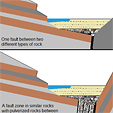 They must have assumed the paystreak was spotty and had been mined out, so they never mined as close to the side of the valley as they should have.
They must have assumed the paystreak was spotty and had been mined out, so they never mined as close to the side of the valley as they should have.
Hard Rock 101: Micro Blasting
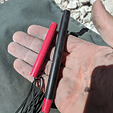 Micro blasting can be used to take down hanging rock, separate minerals from overburden, and collect gemstones and other high-value product with minimal damage.
Micro blasting can be used to take down hanging rock, separate minerals from overburden, and collect gemstones and other high-value product with minimal damage.
My Lucky Thirteen Nuggets
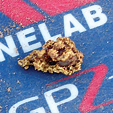 Even with my favorite top-of-the-line gold detector there were several false digs. Many of the hot rocks gave a solid signal that was too much like a nugget to ignore. After trying several tests I just dug everything because it is better to be safe than leave a big, deep nugget for a more diligent gold hunter.
Even with my favorite top-of-the-line gold detector there were several false digs. Many of the hot rocks gave a solid signal that was too much like a nugget to ignore. After trying several tests I just dug everything because it is better to be safe than leave a big, deep nugget for a more diligent gold hunter.
The Significance of Nuggets in Placers
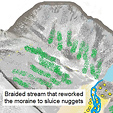 Chances are better that both types of gold did not come from the same source. Let's look at the probable conditions to cause two types of gold in a placer.
Chances are better that both types of gold did not come from the same source. Let's look at the probable conditions to cause two types of gold in a placer.
Salted Mining Properties—How to Properly Evaluate a Claim
Sometimes there are good mining claims on the market available to purchase, but there are also folks out there who are willing to take your money under false pretenses. Don’t fool yourself into thinking that these wolves in sheep’s clothing are few and far between.
Following Clues to an Old Mill and Vein Strike
My last update on this adventure was in the April 2012 issue and involved our search for the northern extension of the Cedarberg Mine. At that time we had found it and we were in the process of returning for some detecting when Mother Nature struck with a late rain and snow storm.
Subscription Required:
The Bawl Mill
• Legislative and Regulatory Update
• Ask The Experts - What Do I Look For and How Do I Sample?
• Ask The Experts - Prospecting Around Graeagle
• Hunting Down Paystreaks
• Deep Nuggets From The Strange Little Patch
• We’re Still Thinking About It
• Springtime Sampling In The High Desert
• How to Evaluate Mineral Claims—What to Know Before You Buy
• Dredging Safety: Don't Ignore The Warning Signs
• Russian Plane Spills 3 Tons of Gold on Runway
• Melman on Gold & Silver
• Mining Stock Quotes and Mineral & Metal Prices
Free:

